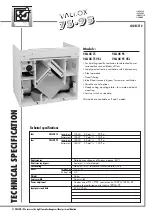
Operating instructions
K3G310-BB49-32
Translation of the original operating instructions
;
Even devices explicitly intended for outdoor use are to be stored as
described prior to commissioning.
;
Maintain the storage temperature, see
Chapter 3.6 Transport and storage conditions.
;
Make sure that all cable glands are fitted with dummy plugs.
2. INTENDED USE
The device is exclusively designed as a built-in device for conveying
air according to its technical data.
Any other usage above and beyond this does not conform with the
intended purpose and constitutes misuse of the device.
Customer equipment must be capable of withstanding the mechanical
and thermal stresses that can arise from this product. This applies for the
entire service life of the equipment in which this product is installed.
Intended use also includes
●
Using the device only in power systems with grounded neutral (TN/
TT power systems).
●
The device is to be used in networks with network quality
characteristics as per EN 50160.
●
Using the device only in stationary systems.
●
Performing all maintenance work.
●
Conveying air at an ambient air pressure between 800 mbar and
1050 mbar.
●
Using the device within the permitted ambient temperature range; see
Chapter 3.6 Transport and storage conditions and
Chapter 3.2 Nominal data.
●
Operating the device with all protective devices.
●
Following the operating instructions.
Improper use
In particular, operating the device in the following ways is prohibited and
could be hazardous:
●
Operating the device in an unbalanced state, e.g. due to dirt deposits
or ice formation.
●
Resonant operation, operation with severe vibration. This also
includes vibration transmitted to the fan from the customer installation.
●
Operation in medical equipment with a life-sustaining or life-support
function.
●
Conveying solids in the flow medium.
●
Painting the device
●
Connections (e.g. screws) coming loose during operation.
●
Opening the terminal box during operation.
●
Conveying air that contains abrasive particles.
●
Conveying highly corrosive air, e.g. salt spray. Exception: devices
designed for salt spray and correspondingly protected.
●
Conveying air with high dust content, e.g. suctioning off sawdust.
●
Operating the device close to flammable materials or components.
●
Operating the device in an explosive atmosphere.
●
Using the device as a safety component or to perform safety-related
functions.
●
Operation with completely or partially disassembled or manipulated
protective devices.
●
In addition, all applications not listed among the intended uses.
Item no. 51427-5-9970 · ENU · Change 210976 · Approved 2020-03-21 · Page 3 / 14
ebm-papst Mulfingen GmbH & Co. KG · Bachmühle 2 · D-74673 Mulfingen · Phone +49 (0) 7938 81-0 · Fax +49 (0) 7938 81-110 · info1@de.ebmpapst.com · www.ebmpapst.com
































